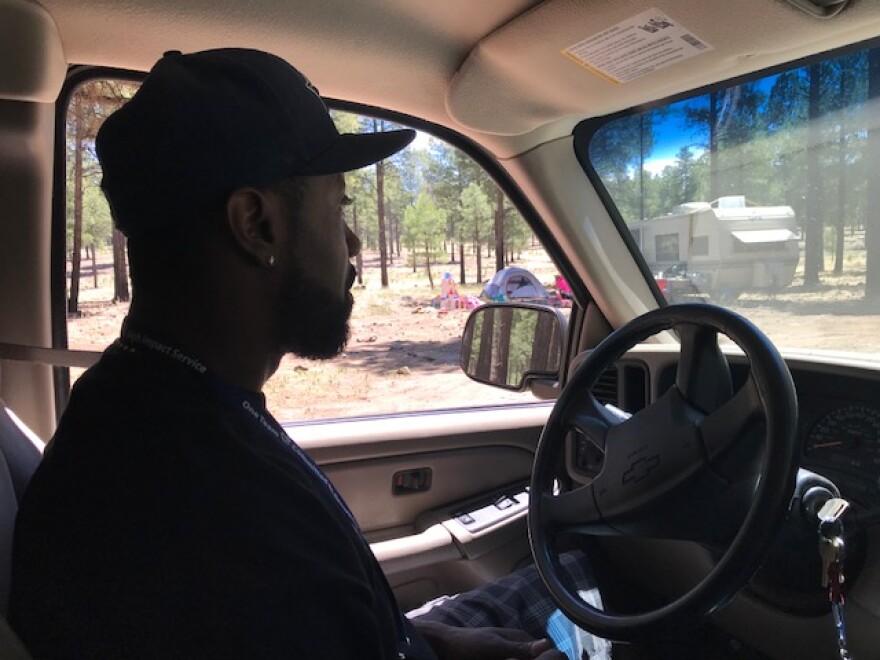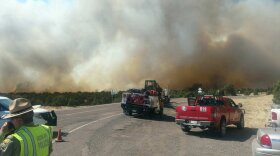People experiencing homelessness often turn to national forests as a temporary place to live. But, partial closures on the Coconino due to fire danger are steering many out of the woods and into already crowded shelters. As KNAU’s Aaron Granillo reports, non-profits, churches, police, and others are teaming up to offer safe and legal options for the region’s homeless.
Corrin Johns drives through the forest near Woody Mountain Road, hauling a truckload of clothes, sleeping bags, and personal hygiene products. He works for Catholic Charities in Flagstaff, an outreach organization that helps vulnerable populations.

“Got some socks, shampoo, conditioner, deodorant,” says Johns. “At least try to keep people somewhat clean.”
He comes across a man named Kevin, who’s been camping in a legal area with his family for about a week. Johns offers him a few toothbrushes, a flashlight, and some information.
“This is actually a resource list of different areas in town,” Johns tells Kevin. “There’s a lot of stuff in here that could get you whatever assistance if you need assistance.”
There are no solid statistics on how many people live in the national forest, a viable and legal option for up to 14 days at a time. But, the Arizona Department of Housing estimates nearly 670 people experience homelessness on a daily basis in Coconino County. About a quarter of them come to Flagstaff Shelter Services for help. Ross Altenbaugh is executive director of the shelter, one of the largest in Northern Arizona. She says the facility has been at capacity since the forest closures took effect last month.
“Including the families, we’re talking 50, 60, 70 more people a day,” says Altenbaugh. “We’ve seen over ten families in the last six days that need shelter. That’s atypical for our program.”

Altenbaugh has teamed up with local churches to set up overflow shelters. She’s reached out to food banks and the community for extra donations - everything from snacks and blankets, to diapers and formula. Law enforcement is also helping.
“We’ve spoken with the police department about that they don’t want to be criminalizing homelessness,” says Altenbaugh. “So, if they find people they want to get them to us.”
The Forest Service says it does not target homeless encampments, but it does have to enforce current closures and fire restrictions. Since they took effect, officers with the Coconino have cited at least a dozen individuals for forest residence violations. It’s a steep fine, and one that James, who gives no last name, wants to avoid. He’s been homeless for about six-years, and was living in the woods near Flagstaff before the closures.
“So, I said okay. I’m going to get my tent all taken down and everything,” says James. “Because I don’t want to get no fines. I don’t want to go to jail.”
He’s at a shelter now. But with nine months sobriety, he says it’s not an ideal environment for him.
“People drink outside, and they sneak it in here and they’re drunk. I usually avoid them,” says James. “But, camping was really nice. I could be myself and thought about a lot of things, my future. What my goals are going to be.”
His ultimate goal is to find a full time job and work himself out of homelessness. For now, the shelter is one of the only living options for James and hundreds of others, while forest closures remain in effect.






